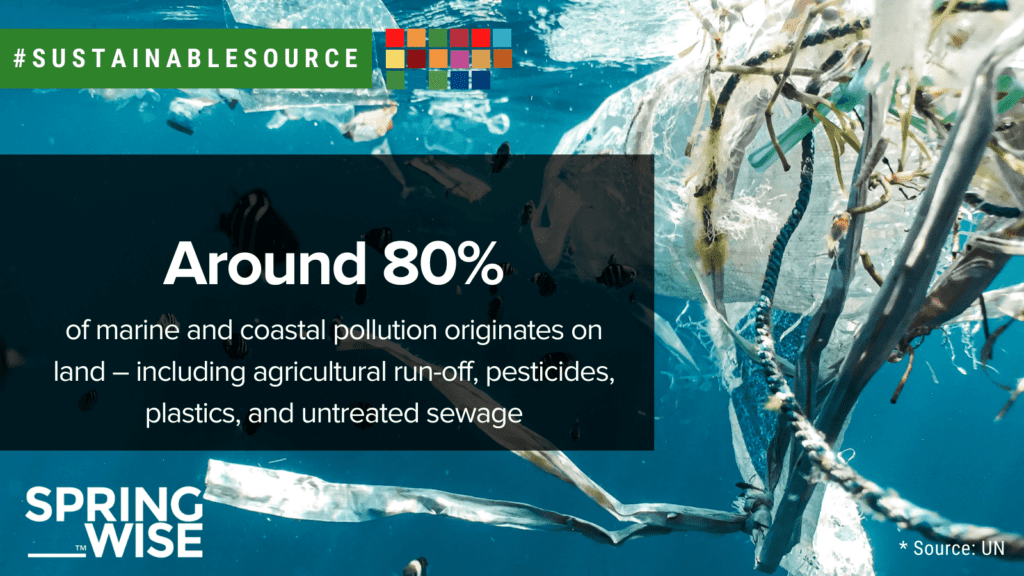Oceans are the cradle of life and make up 95 per cent of the space available to living things. Yet research shows that marine biodiversity is declining dangerously, with humans the biggest cause. And each year 8 million tonnes of plastic waste escape into the sea.
The ocean matters to humanity in more than one way. Not only does it support the livelihoods of billions of people – it also has an enormous influence on the climate. An estimated 83 per cent of the global carbon cycle is circulated through marine waters, and oceans have absorbed around a third of all the CO2 ever produced by humans. Moreover, marine waters contain resources that are extremely useful in the fight against climate change. Seagrass meadows sequester carbon up to 35 times faster than tropical rainforests, and seaweed is used in a wide range of sustainable innovations.
Given the importance of oceans to our shared future, many innovators are looking to the ocean for inspiration. Although international co-operation and government action are essential for enacting change, innovation will also play a crucial role in protecting life below water.
Ocean pollution
Around 80 per cent of ocean pollution is caused by our lives on land through sources such as agricultural run-off, pesticides, plastic, and untreated sewage. And much ocean pollution ends up on the seafloor – including 60 per cent of chemical leaks, oil spill-offs, and micro-plastics. Latvia’s PurOceans Technology is tackling seafloor pollution in a unique way. The company pumps bubbles of ambient air to the lowest depths where they stick to chemical pollutants and float back to the surface.
To garner corporate funding and support for pollution clean-up, startup CleanHub has developed a tech platform that connects brands whose plastic products may end up in the ocean with local plastic collection schemes.

Marine and coastal ecosystems
Marine ecosystems are not only crucial for the vast array of species that live in them – they are also integral to the global economy. For example, hundreds of millions of people around the world rely on coral ecosystems for food and economic security. Yet, according to the UN Environment Programme, around 14 per cent of the world’s coral has been lost since 2009. In response, Blue Oasis Technologies has developed engineered underwater ‘cities’ that are designed to save coral. The structures are made up of 55-tonne modules that are lowered into the ocean with a crane, as well as smaller, stackable modules. Elsewhere, a project by Danish energy company Ørsted aims to provide a ‘safe haven’ for corals by growing them at the base of wind turbines.
While coral reefs receive a lot of well-deserved attention, they are not the only form of marine ecosystem. Seagrass meadows are home to myriad animals and plants, and act as extremely effective carbon sinks. Non-profit Beneath the Waves has teamed up with digital data company Hexagon AB to map seagrass meadows using airborne laser technology. The enhanced data will improve the accuracy of monitoring and restoration efforts.

Overfishing
The world produces around 200 million tonnes of fish and seafood every year. Statistics on overfishing are notoriously complex (and controversial). But a 2017 assessment by the Food and Agriculture Organization of the United Nations found that over one-third of fish stocks are overfished. And the proportion of fish stocks that are over-exploited has increased over time.
One particular issue connected to fishing is by-catch. Globally, we throw just under 10 per cent of the fish and marine animals we catch back into the ocean. To help reduce the impact of fishing on marine life, France’s National Institute for Ocean Science is working with a number of partners to pilot an AI-powered smart net that can sort fish in the water, preventing by-catch. A simpler approach, tested in a study in Mexico, is to use illuminated fishing nets that reduce both by-catch and fishers’ workload.
SDG 14 also mentions illegal fishing as a particular challenge. In Korea, the government is leveraging drones, artificial intelligence, and the internet of things to manage octopus resources and reduce illegal fishing.
Scientific knowledge
To effectively protect and preserve our oceans, it is important for us to understand them. But more than 80 per cent of the ocean is unmapped, unobserved, and unexplored, and it is estimated that 91 per cent of ocean species are yet to be classified by science.
One way we can bolster our scientific knowledge of the oceans is through autonomous vehicles. The UK’s National Oceanography Centre has developed two new classes of autonomous underwater vehicle that can operate up to 1500 metres underwater. And, in China, a new autonomous vessel that serves as the mothership for a fleet of intelligent, self-driven air, surface, and underwater research drones, is currently undergoing trials.

Words: Matthew Hempstead
Know more innovations supporting SDG 14? Spread the word!
Sign up to the Sustainable Source newsletter to receive regular updates on the green innovations that matter and to get our insights into innovation and the SDGs direct to your inbox.
7th June 2022

